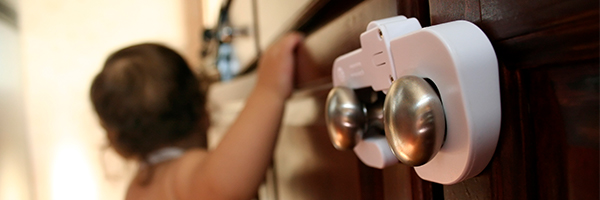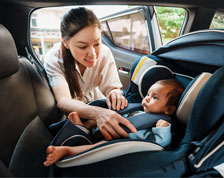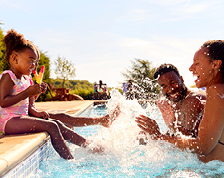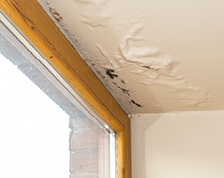Make your home safer for kids
Posted in General, Home

Your home can present some of the biggest dangers for your child’s safety. According to the Centers for Disease Control and Prevention, an estimated 9.2 million children annually had an initial emergency department visit for an unintentional injury. The good thing is most of these accidents are preventable.
Here are some things you should know and the steps you can take to make your home a safe place.
Kitchen
- Install latches on lower cabinets. It is a good rule of thumb to have locks on any cabinet and drawer that is within reach of your child. These latches will impede your child from getting into anything potentially hazardous in your kitchen, such as breakable dishes and heavy kitchen appliances (e.g., mixer).
- Put away sharp objects. Another precaution to take is to put away any sharp objects in your kitchen, making it impossible for your child to get ahold of things like knives or scissors. When using sharp utensils in the kitchen, never leave them unattended and within reach of your child.
- Use pots and pans on the back burners. Avoid burn injuries by only using your back burners for cooking. Another tip for the kitchen is to turn pot and pan handles inward and away from the front of the stove so children can not bump them or grab them.
Bedroom and Living Rooms
- Anchor dressers and heavy furniture. Many times, children cause a tip-over by climbing on the front of a dresser or playing inside a drawer. Furniture tip-overs can result in tragic injuries and death. You should anchor wardrobes, dressers, bookcases, televisions or any large piece of furniture because these items have the potential for tipping over. Securing these items only takes a few minutes and could save a life.
- Cover electrical outlets. Electric shock is a severe injury among young children. Covering electrical outlets will prevent your child from sticking fingers, silverware or toys into an outlet and experiencing electrocution.
- Shield sharp corners and edges. Covering the sharp corners on your tables, counters, cabinets, window sills, and/or walls will prevent hurtful bumps or cuts to your child, especially on their head. Children are typically unaware of their surroundings when running and playing at home, making it your job to be sure that when the inevitable bumps happen, they do not result in injury.
- Install doorknob locks or covers. Exterior doors, interior doorknobs, cabinets and sliding patio doors can and should be appropriately child-proofed to ensure the safety of your little ones. Potential dangers await inside and outside the home, such as street traffic, a balcony, cleaning supplies or a backyard pool, to name a few.
- Put away potential choking hazards. Small items such as marbles, paper clips and wrappers can easily restrict your child’s airway if put in their mouth. Make sure to collect those types of objects from your floor and low surfaces around your home and be aware of anything you may drop or break to ensure it will not end up in your child’s hand or mouth.
- Install safety gates. The American Academy of Pediatrics recommends baby gates as an essential part of home safety. The most common spot is at the top and bottom of stairs. Gates can also be used to establish safe play boundaries from pets and from non-child-proofed rooms within your home or when traveling.
- Install cordless window treatments. For your windows, cords on blinds and shades pose another household hazard to your child. Choose cordless window treatments or prevent access to cords by keeping them out of sight and reach to reduce the risk of strangulation.

Learn about our
Home Insurance
Bathrooms
- Always supervise bath time. Never, under any circumstance, leave a child alone in the bathtub. According to The American Academy of Pediatrics, babies can drown in as little as just one or two inches of water. It can happen silently and within seconds. Always stay with your child during a bath.
- Store medication out of reach. It is easy for your child to overdose on medication. You can prevent this by placing medication in a high-up, locked cabinet at all times. Never leave medicine on tables, nightstands or dressers when in reach of your little one.
- Install toilet locks. This will prevent children from flushing foreign objects down the toilet, causing damage to your toilet and pipes or flooding your bathroom. More specifically, toilet seat locks will help refrain your child from opening the lid in any circumstance.
- Lock up all chemicals. Like medication, store cleaning supplies in a locked cabinet or somewhere high-up so your child isn’t exposed to potential poisoning. According to the Environmental Protection Agency, 1 million poisoning incidents occur each year in children six years and younger, with 90% occurring in the home.
Backyard
- Put playsets in a safe location. When setting up a playset, be conscious of staying far away from trees and power lines. It's also in your child's best interest to avoid placing it over or near hard surfaces, which could result in fractures or other injuries if they fall off the playset.
- Understand trampoline risks. Out of all playground equipment, trampolines are the riskiest. Your trampoline should be netted and fenced-in to ensure there is no possible way a child can fall off and sustain an injury.
Most homeowner’s insurance policies cover your trampoline or playset, but only if it is properly maintained and you have followed safety measures. It is important to check with your independent insurance agent to find out if you are covered.
These tips can help keep your child safe and could potentially reduce the chance of injury at home. Remember, the most important safety precaution is always to supervise your child carefully.
Sources:
- Centers for Disease Control and Prevention
- Environmental Protection Agency
- American Academy of Pediatrics
Coverages described herein may not be available in all states. Please contact a local independent Integrity agent for complete details on coverages and discounts. If the policy coverage descriptions herein conflict with the language in the policy, the language in the policy applies. The material provided above is for informational, educational, or suggestion purposes and does not imply coverage. WE RESERVE THE RIGHT TO REFUSE TO QUOTE ANY INDIVIDUAL PREMIUM RATE FOR THE INSURANCE HEREIN ADVERTISED. Integrity Insurance policies are underwritten by Integrity Insurance Company, an affiliate of Grange Insurance Company, and Integrity’s subsidiaries. Integrity companies not licensed in Pennsylvania. Not all Integrity companies are licensed in all states.
Related resources

Posted in General, Auto
Most heat-related incidents are unfortunate, however they are preventable. Learn how to keep children and pets safe from the risks associated with being in a hot car.

Posted in General, Home
A pool can provide family fun, but it also has risks. Learn how to secure the pool on your property and keep your loved ones safe all summer long.

Posted in Home
You can take precautions to reduce the risk of property damage to your home. Water damage, fire damage and theft are all reasons you may need to submit a home insurance claim, but there are tips you can follow to prevent risk and damage.